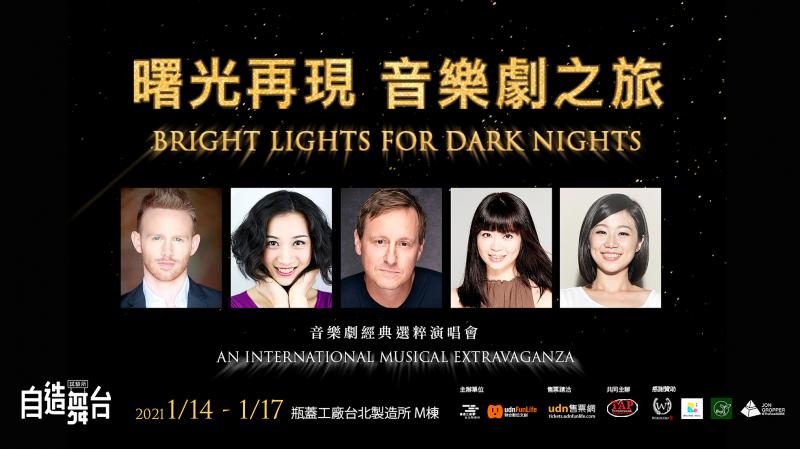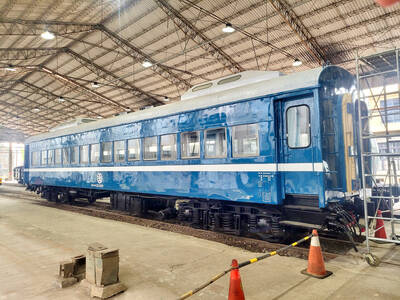Music of all genres can provide hope and inspiration, cheer us up when we are down or encapsulate our despair when we are feeling low and just want to wallow for a while.
Songs are the hallmarks by which we measure life’s passages. Tunes from Broadway musicals serve this role well, which is why five artists with backgrounds in musical theater and opera, who found themselves safely ensconced in Taiwan during the COVID-19 pandemic, decided to do something to cheer people up.
The result is Bright Lights for Dark Nights (曙光再現 音樂劇之旅), billed as “an international musical extravaganza,” which opened at a performance space in Taipei’s Nangang Bottle Cap Factory last night for a four-show run, featuring songs from musicals of the past 50 years.

Photo: Screengrab from Facebook
The two-act production starts with songs from darker musicals to symbolize the angst that so many people felt last year, with songs from well-known productions such as The Phantom of the Opera, Wicked and Hamilton to those from shows that might not be as well known to local audiences, such as Spring Awakening, Hadestown and Bonnie and Clyde.
Act 2 focuses on the light at the end of the tunnel and the bright lights of Broadway with songs such as Don’t Rain on my Parade, Bring Him Home, Move On and Songs for a New World.
Australian Paul Whiteley, an actor/singer/musician turned event promoter, is one of the producers of the program as well as a performer. His resume includes Australian productions as well as international tours of shows such as The Phantom of the Opera.

Photo: Screengrab from Facebook
Bonnie Lin (林姿吟) is a bel canto soprano with a background in opera and musicals as a performer and choreographer, as well as a television show host.
Mandarin Wu (吳曉清) is a professional singer and dancer and has taught musical theater, dance and choreography at universities in New York
Carol Chang (張芳瑜), a graduate of the Chinese Culture University’s drama department, has performed in several Taiwanese musical productions as well as being cast in the Canadian tour of The Wrong Car.

Photo: Screengrab from Facebook
Chase W. Nelson is a postdoctoral researcher at Academia Sinica as well as a scientist with the American Museum of Natural History in New York City, but he also has a background as a musician, singer and actor, and is a former member of Trustus Theatre in Columbia, South Carolina.
Backing up the singers is the six-piece Jacob Drumemory Band.
■ Bright Lights for Dark Nights, tonight through Sunday at 7:30pm

Photo: Screengrab from Facebook
■ Nangang Bottle Cap Factory, Building M (瓶蓋工廠台北製造所 M棟 ), 13, Nangang Rd Sec 2, Nangang District, Taipei City (台北市南港區南港路二段13號)
■ Tickets are NT$800 to NT$1,200, available through the udn ticketing network online (you need to join the network first by downloading the app from the App Store or Google play store). Tickets purchased online can be picked up through the ticket collection services at the “7-ELEVEN ibon,” “Family Fami-Port” and “Life-ET” kiosks

Feb. 17 to Feb. 23 “Japanese city is bombed,” screamed the banner in bold capital letters spanning the front page of the US daily New Castle News on Feb. 24, 1938. This was big news across the globe, as Japan had not been bombarded since Western forces attacked Shimonoseki in 1864. “Numerous Japanese citizens were killed and injured today when eight Chinese planes bombed Taihoku, capital of Formosa, and other nearby cities in the first Chinese air raid anywhere in the Japanese empire,” the subhead clarified. The target was the Matsuyama Airfield (today’s Songshan Airport in Taipei), which

China has begun recruiting for a planetary defense force after risk assessments determined that an asteroid could conceivably hit Earth in 2032. Job ads posted online by China’s State Administration of Science, Technology and Industry for National Defence (SASTIND) this week, sought young loyal graduates focused on aerospace engineering, international cooperation and asteroid detection. The recruitment drive comes amid increasing focus on an asteroid with a low — but growing — likelihood of hitting earth in seven years. The 2024 YR4 asteroid is at the top of the European and US space agencies’ risk lists, and last week analysts increased their probability

For decades, Taiwan Railway trains were built and serviced at the Taipei Railway Workshop, originally built on a flat piece of land far from the city center. As the city grew up around it, however, space became limited, flooding became more commonplace and the noise and air pollution from the workshop started to affect more and more people. Between 2011 and 2013, the workshop was moved to Taoyuan and the Taipei location was retired. Work on preserving this cultural asset began immediately and we now have a unique opportunity to see the birth of a museum. The Preparatory Office of National

On Jan. 17, Beijing announced that it would allow residents of Shanghai and Fujian Province to visit Taiwan. The two sides are still working out the details. President William Lai (賴清德) has been promoting cross-strait tourism, perhaps to soften the People’s Republic of China’s (PRC) attitudes, perhaps as a sop to international and local opinion leaders. Likely the latter, since many observers understand that the twin drivers of cross-strait tourism — the belief that Chinese tourists will bring money into Taiwan, and the belief that tourism will create better relations — are both false. CHINESE TOURISM PIPE DREAM Back in July